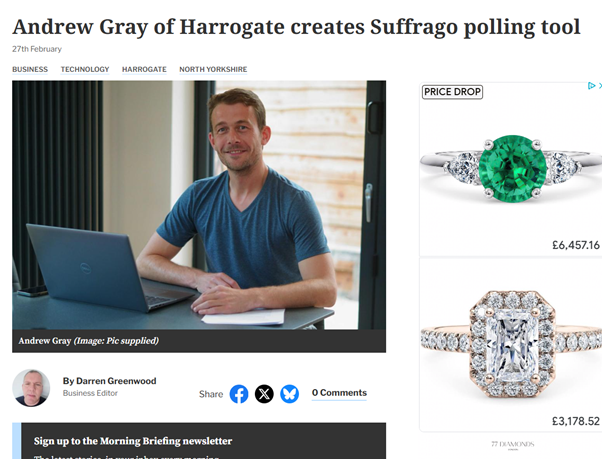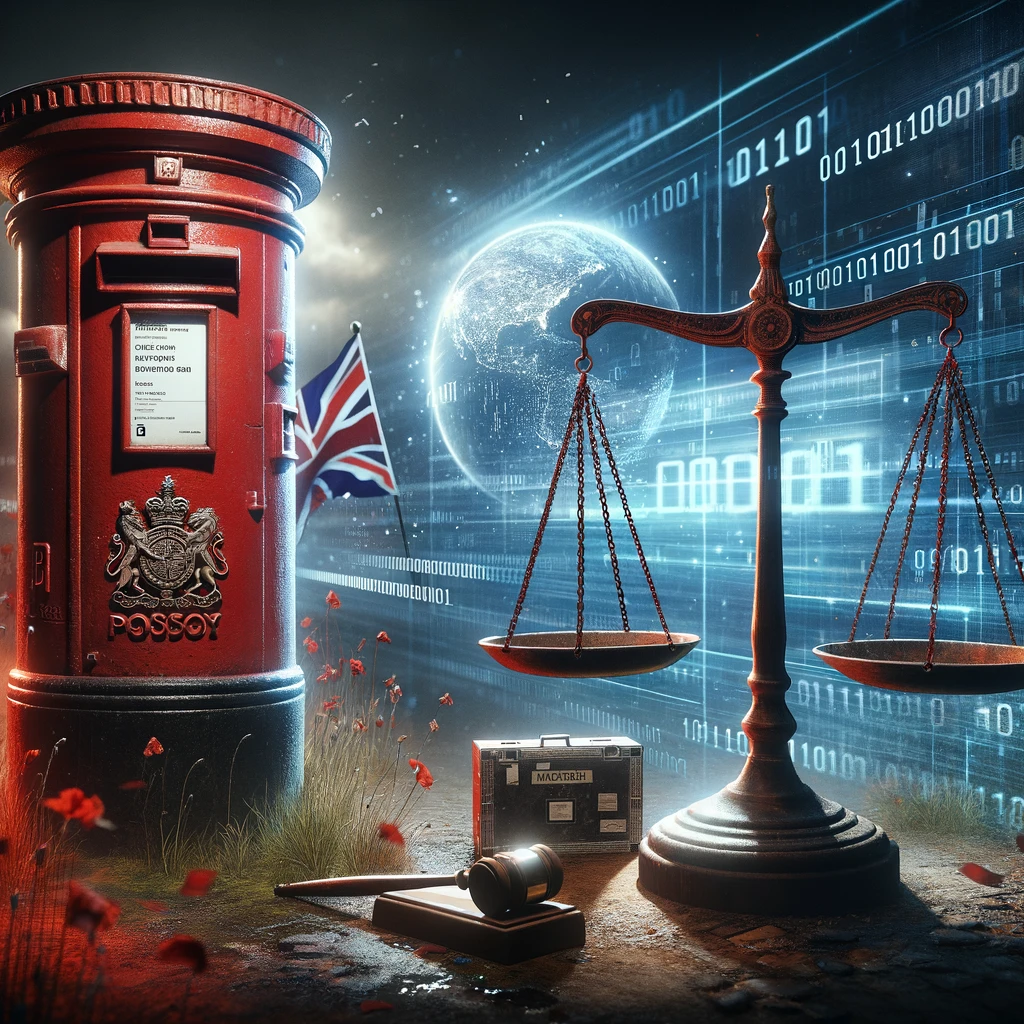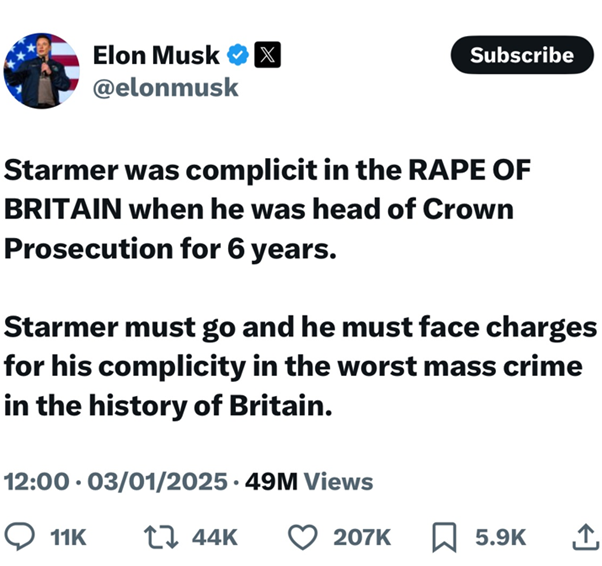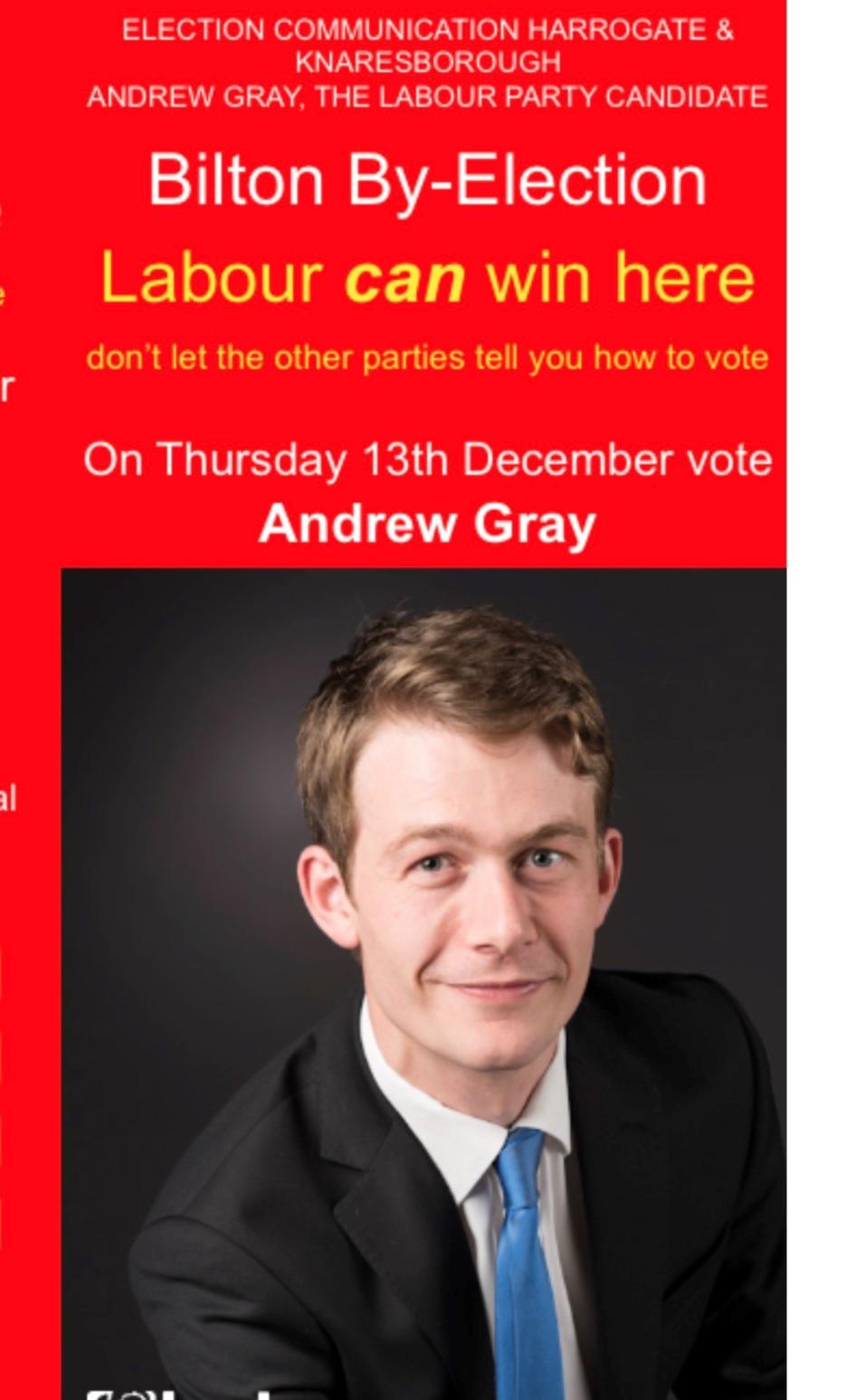Recently, I finished reading In Harm’s Way by legendary BBC reporter Martin Bell, published in 1996. Bell, as you may recall, came to prominence as a war reporter in the first Gulf War and then in the Balkans. Later on in his career, when the Conservative Party was mired in yet another sleaze scandal, Bell stood in the Cheshire constituency of Tatton, ousting Neil Hamilton. You may recall his white suit.
Having travelled in Bosnia and Serbia myself, not long after NATO bombed Belgrade, I hung on Bell’s every word. As a former soldier, Bell knew how to navigate a war zone, only sustaining serious injury on one occasion, and losing several colleagues in the process. His war reportage was essential, shaping world opinion.
Let me draw your attention to the key section of chapter 16, entitled “Shading the Truth”. Bell takes us to one his earliest stints reporting for the BBC during The Troubles in Northern Ireland. He writes:
“It happened in August 1969, when sectarian tensions which had been simmering for months spilled over into open conflict in Belfast, and Roman Catholics were burned out of their homes in borderline streets between the Shankill and Falls Rd. I was out and about in the ruins with my friend and cameraman Peter Beggin, whose images caught the plight of these desperate people. They returned to their homes only once, to leave again with what they could carry or push in a pram. Later in the day we were minding our own business and editing these pictures together for the evening news, when I felt the presence of Authority in the cutting room behind me. ‘Martin.’ said the voice of Authority in its distinctive Malone accent. ‘I’m sorry but you can’t say that.’
‘Can’t say what?’ I inquired innocently.
‘You can’t say that they’re Catholics. You’ll have to call them refugees.’
‘But you know that Catholics and I know their Catholics and just about the whole of Belfast knows they’re Catholics. Look at that picture there – are you trying to tell me it is a Protestant woman pushing a pram-load of her belongings with a crucifix on top of it?’
‘Look, I live here and you don’t, and I’m responsible for what is broadcast here. Our duty is to calm things down, not to provoke another riot. These people are refugees.’…
In this case we made fools of ourselves to no purpose. We outraged the Catholics, failed to appease the Protestants, and generally short-changed all our viewers by denying them the truth…..To this day I don’t know why I went along with it, except that I was young and inexperienced and impressed by Authority, who was surely knew his Belfast better than I did.
That was not the end of it, though. The shocking part of it was not Authority’s behaviour but mine and I then compounded the felony by lying about it.”
Tantalisingly, Bell didn’t say who the shadowy “Authority” figure was. In the same chapter, Bell also explained that many of the BBC’s most decorated journalists from World War Two were embarrassed by their many fabrications, all told in the supposed national interest. In times of war, the BBC lies, is the message in the chapter, from one of its heroes.
…………………………………………………….
Today, I was reminded of this story, not just because I ran a law firm with “Truth” in its name, but because of some dubious BBC fact-checking I noticed in relation to the hundreds of deaths at the Baptist Hospital in Gaza on 18 October 2023. Each side blamed the other.
In a supposed effort to uncover the truth, the BBC opened one of their Verify pages on their website, here, to determine who was to blame. This first article was then updated on 26 October, here. On first reading, both BBC pieces appear reasonable, fair, impartial. Move along, nothing to more to see here. (Prime Minister Sunak would later say that it was “likely” that the rocket was fired by Palestinians – “likely” requiring a military assessment of circa 55% probability, so we Brits weren’t entirely convinced who was to blame.)
As luck would have it, a few weeks ago I watched Al Jazeera news. In it, they showed the Palestinian Ambassador to the UN stating in a press conference that the Israelis had initially celebrated and claimed the attack on the hospital. Nonsense, I thought, for such pertinent evidence would have been brought to my attention by the BBC, upon whom most of us Brits, rely.
So I began my research, which produced the below Tweet:
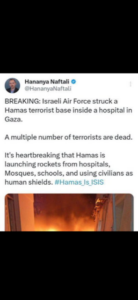
Not long later, the tweet was deleted:
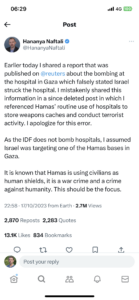
So, what? An erroneous tweet sent in the fog of war. But not so fast. The tweeter – Hananya Naftalie – is no other than Benjamin Netanyahu’s Deputy Social Media advisor and an IDF officer. To quote this article in The Jerusalem Post: “Prime Minister Benjamin Netanyahu’s new deputy social media adviser Hananya Naftali is a popular Israel advocate online, served in the Armored Corps, fought Hamas in Operation Protective Edge, and calls himself a Jew who loves Jesus.”
So close is Netanyahu to Naftali that the Israeli PM spoke at Naftali’s wedding, praising his content creation. Watch the video here. And here is a video tweet from Naftali, in IDF fatigues, explaining that he is part of the IDF’s social media team. Most interconvertible.
Now I don’t know who fired what. I’m of course unqualified to say. However, given that Hamas have fired a staggering and despicable 30,000 rockets into Israel, killing 79 people in nearly two decades, I find it hard to believe that they have rockets which could do such damage. However, I also do not believe that the IDF would hit a carpark in which hundreds of people were sheltering (although they had demanded the hospital’s prior evacuation) and I don’t believe what Hamas have to say. Furthermore, Hamas have not, to my knowledge, shown evidence of an Israeli ordnance. Perhaps the UN investigation will uncover the truth in due course. Doubtless, the investigators will be interested in who confessed to that attack
But what I do know, with close to certainty, is that what Bell identified in 1969 is repeating itself here: the BBC are not telling the audience the full facts. As every history teacher implores their students, be careful of your source material.



